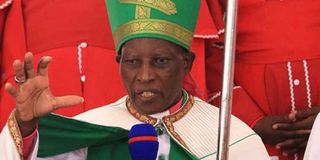Premium
Archbishop Julius Njoroge now abandons AIPCA peace talks

AIPCA Archbishop Julius Njoroge who has has announced his withdrawal from the ongoing peace talks that are aimed at unifying worshipers and the leadership of the church. PHOTO | FILE | NATION MEDIA GROUP
What you need to know:
- He said that the talks being led by retired bishops Lawi Imathiu and Peter Njenga will not help in resolving the leadership feuds.
- Archbishop Njoroge further said that he will oppose the amendment of the AIPCA constitution as a method to end the disputes.
- Recently, worshipers at Kiuu AIPCA Church in Githurai walked out on Archbishop Njoroge.
One of three archbishops of the African Independent Pentecostal Church of Africa (AIPCA) has announced his withdrawal from the ongoing peace talks that are aimed at unifying worshipers and the leadership of the church.
Archbishop Julius Njoroge suggested that instead of participating in the reconciliation process spearheaded by President Uhuru Kenyatta, the church’s constitution should be interpreted by the Registrar of Societies regarding succession in leadership.
He said that the talks being led by retired bishops Lawi Imathiu and Peter Njenga, which started in mid-2018, will not help in resolving the leadership feuds that have rocked the church since 2016.
CONSTITUTION
“I want the church’s constitution to be read, interpreted and complied with completely to see what is wrong. Negotiation will not help because it seeks to have some people accommodated in the leadership,” he told Daily Nation.
Archbishop Njoroge added that the dialogue also seeks to abet the violation of the church’s constitution and circumvent the Societies Act.
He insisted that he is the legal head of the church, saying he was elected according to provisions of its constitution which is in place and has not been amended.
“Negotiation is not in our constitution but in the mandate of the Registrar of Societies. My stand is the leadership should be according to the constitution not what people are saying,” he stated.
SPLINTER GROUP
While terming the faction led by archbishops Fredrick Wang’ombe and Samson Muthuri as a splinter group, Archbishop Njoroge further said that he would be opposed to the amendment of the AIPCA constitution as a method to end the disputes.
“I am there by right. Those who defected and formed the splinter group should allow for the interpretation of the constitution. It cannot be changed to have other people accommodated. They would have come to the election to win or lose but not defecting and demanding negotiations,” he stated.
It is the second time the conflict resolution process has flopped after another bid to reunite the church was scuttled by elders last year.
The elders overturned a leadership formula that had been reached by the three archbishops.
In the proposal, they had agreed to divide the church into three main archdioceses to be led by the three archbishops.
NATIONAL ARCHBISHOP
They had also settled to the creation of the position of a national archbishop who would be the overall head of the church.
But the elders said that the three archbishops had no obligation to appoint on their behalf the national archbishop.
Archbishop Njoroge, whose term as is ending in 2022 when he attains the age of 70, recently got into trouble after worshipers at Kiuu AIPCA Church in Githurai stormed out when he showed up for Sunday service.
“My term of leadership has been misused for two years but I do not intend to extend my stay in office. Succession is through an election that is conducted by the Registrar of Societies not an appointment,” he stated.
WALKOUT
The worshipers urged him to leave the church but when he refused they walked out, leaving him alone.
There are now two rival camps in the church after that of archbishops Wang’ombe and Muthuri reunited at Muthuaini AIPCA church in Tetu, Nyeri during the annual holy oil consecration.
The church held two parallel consecration ceremonies, one in Meru presided over by Archbishop Njoroge and another in Nyeri supervised by Archbishop Wang’ombe and Archbishop Muthuri.





